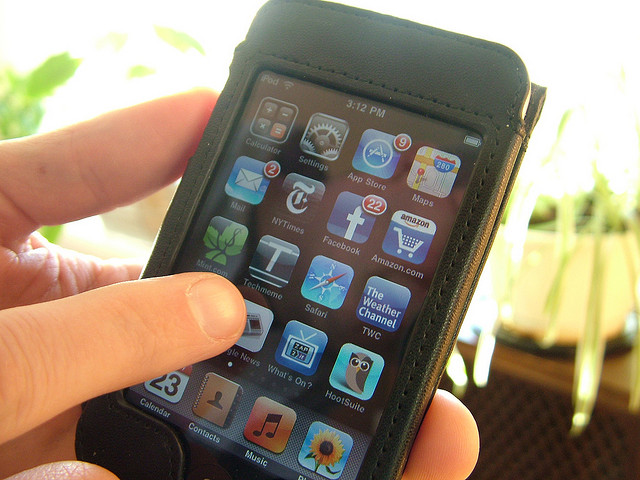 Photo Credit: iPod in 30 minutes
Photo Credit: iPod in 30 minutes Today, there seems to be an app for pretty much everything. However, you might be surprised to learn that there are actually apps designed to help make us happier. Psychologists have found that apps like these can actually work, so I decided to try one of them out for a week to see for myself. I wondered whether I could really improve my mood just by spending a few minutes on my phone.
What are happiness apps like? To test out the world of happiness apps, I downloaded a popular app, Happify, and used it for a little over a week. In Happify, you start out by answering some questions about yourself and then choose a “track” based on the goals you want to accomplish. For each activity you complete in Happify, you earn points and advance to the next level after completing enough activities (you can choose whether to keep your activity on Happify private, or share it with other users of the app). Some sample activities on Happify include savoring the moment (I was asked to walk around my neighborhood and notice beautiful things I might normally take for granted), doing something nice for someone else, and watching a nature scene while being guided through a meditation.
One thing I especially liked about Happify is that it incorporates references to psychology research on happiness, so you know why a given activity is helpful. I also found that the app was straightforward to use, and not very time consuming: many activities can be completed in 2-5 minutes and you can choose how often you complete an activity, so it was easy to fit the activities from the app into my schedule. I found that my mood was better and I felt more relaxed after working on my favorite activities on the app; however, since I only used it for a short amount of time, it’s harder to tell what long-term effects it might have.
What does the research say? Since happiness apps are relatively new, there haven’t been many published studies on their effectiveness—but there are some indications that these types of apps can indeed be beneficial. One recent study found that people who used a happiness app showed increases in happiness. Additionally, using the app more often and using a wider variety of activities in the app predicted greater improvements. Another study asked people to use a mindfulness app for 10 days. Afterwards, people using the app showed higher levels of positive emotions (e.g. interest, excitement, and inspiration) & lower levels of depression.
What other apps are available? It would be impossible to list all of the happiness apps available, but here are a few additional apps that are widely used and free (or free to try):
- Happier: Happier is a social network devoted to sharing happy moments, and it also includes online classes on a variety of topics, such as “Attitude: Gratitude” and “Seven Happier Habits.”
- Headspace: Research has found that mindfulness meditation can benefit well-being and even leads to changes in brain structure (such as increases in gray matter in a brain region involved in learning and memory). If you’re interested in trying out meditation for yourself, there are a number of apps available, including Headspace. Headspace is the meditation app that was used in the study I mentioned previously on mindfulness. It offers 10-minute guided meditations for 10 days (with an option to buy a subscription if you like it). I tried out one of their meditation sessions and found that having the audio recording was quite useful for staying focused during the 10-minute period.
- Track Your Happiness: If you’re interested in trying your own science experiment on happiness, Track Your Happiness allows you to answer questions about your current mood and what you’re doing. After answering these questions over time, you’ll be given a report that tells you during which activities you are the happiest.
It’s important to remember that these apps aren’t a substitute for other mental health treatments—if you think you might have anxiety or depression, it’s important to reach out to a therapist instead of relying on an app. However, if you’re looking to find ways to relax during a stressful day or to stop and notice the good things in life, you may want to try out an app and see if it’s right for you.
Further Reading:
Sue McGreevey: Eight Weeks to a Better Brain
About this Contributor: Elizabeth Hopper is a PhD candidate in Social Psychology at the University of California, Santa Barbara. Prior to attending UCSB, she received her BA in Psychology and Peace & Conflict Studies from UC Berkeley and worked in a research lab at UC San Francisco studying health psychology. Her research interests include positive emotions, close relationships, coping, and health. Outside of the research lab, Elizabeth can often be found going to yoga class, teaching her puppy new tricks, and working on her creative writing.
Leave a reply
You must be logged in to post a comment.

analyze life said on October 13, 2016
analyze.life is a happiness app based on the concept of mindful living. It will encourage you to be present, to pay attention to yourself and your surroundings, and to take notice of your feelings – the first stepping stones to happiness.